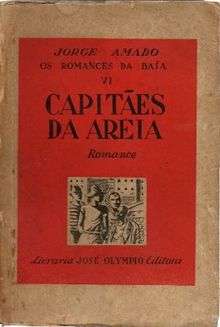Captains of the Sands
 First edition | |
| Author | Jorge Amado |
|---|---|
| Original title | Capitaes da areia |
| Translator | Gregory Rabassa |
| Cover artist | Kristen Haff |
| Country | Brazil |
| Language | Portuguese |
| Publisher | Livraria Jose Olympico Editora |
Publication date | 1937 |
Published in English | 1988 |
| ISBN | 978-0-14-310635-7 |
Captains of the Sands (Portuguese: Capitães da Areia) is a Brazilian Modernist novel written by Jorge Amado in 1937.
The novel tells of a gang of one hundred orphans and abandoned children. They are seven to fifteen years old and live by begging, gambling and stealing, abandoned in the streets of Salvador, Bahia, Brazil. The lead character is Pedro Bala, the leader of the gang, and other important characters include the "Professor (Teacher)", Boa-Vida ("Good Life"), "Barandão", João Grande (Big John) and Sem-Pernas (Legless). Critics have tended to dismiss Amado’s earlier works, such as Captains of the Sands, as being political polemic rather than novels and for incorporating popular culture, such as Candomblé. In response, Amado said that he set out to tell a story to be enjoyed by all, not to please critics, and to show solidarity with the humanity that lives in the books.[1]
Probably for this reason Captains of the Sands is one of the most popular books among students in Brazil and the story is still known for its socialist idealism. Amado was a member of the Brazilian Communist Party at the time he wrote it. In the year of publication 808 copies were burnt in a square in Salvador, together with works of other authors, under the pretext that they were communist propaganda.[2]
In a Postface to the book, Amado wrote that this was the sixth and final work in the cycle he called "The Bahian Novels" in which he had tried to set down the "life, the customs, the language of my State". He described Captains of the Sands as being about "the existence of abandoned children on the streets of the capital city who go off to the most diverse destinies, children who tomorrow will be the men who will possibly direct the fortunes of Brazil".[3]
References
- ↑ Anderson, Cathleen E. (2001). "Religion and Revolution". Jorge Amado: New Critical Essays. Routledge: 5–20. Retrieved 17 December 2014.
- ↑ CARNEIRO, Maria Luiza Tucci. (1999). O Estado Novo, o Dops e a ideologia dasegurança nacional. In: REPENSANDO o Estado Novo / Dulce Pandolfi,organizadora. Rio de Janeiro. Fundação Getulio Vargas. pp. 327–40.
- ↑ Amado, Jorge translated by Gregory Rabassa. Captains of the Sands (Postface). Penguin Classics. pp. 262–65. ISBN 978-0-14-310635-7.